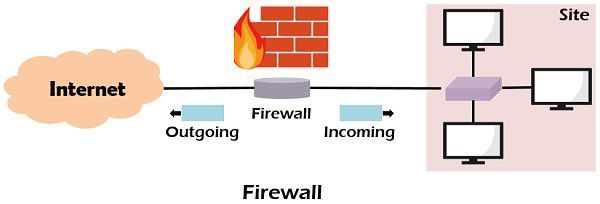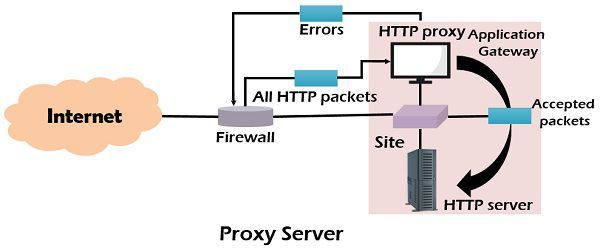 Both the Firewall and the Proxy server reside between the network and the local computer which provides the security against the network threats. The firewall and proxy server works in conjunction. Firewall functions at a lower level and can filter all types of IP packets while the proxy server deals with the application level traffic and filter the requests coming from the unknown client.
Both the Firewall and the Proxy server reside between the network and the local computer which provides the security against the network threats. The firewall and proxy server works in conjunction. Firewall functions at a lower level and can filter all types of IP packets while the proxy server deals with the application level traffic and filter the requests coming from the unknown client.
A proxy server can be considered as a part of the firewall. A firewall basically prevents the access of unauthorised connection. On the other hand, a proxy server mainly acts as a mediator which establishes the connection between the external user and public network.
Content: Firewall Vs Proxy Server
Comparison Chart
| Basis for comparison | Firewall | Proxy Server |
|---|---|---|
| Basic | Monitors and filters the incoming and outgoing traffic in a local network. | Establishes the communication between the external client and the server. |
| Filters | IP packets | Client-side requests for the connection. |
| Generated overhead | More | Less |
| Involves | Network and Transport layer data. | Application layer data. |
Definition of Firewall
The firewall creates a barrier from which the traffic going in different direction must traverse. It functions as a filter at the IP packet level and offers an effective method for protecting, monitoring, auditing the local network from the external network security threats, IP spoofing and routing attacks. It is an integrated solution for network security which not only provides hardware but software based security too. Firewall is a collection of the packet filters and proxy servers (application gateway).
The Packet filter is used to forward and block the incoming and outgoing packets according to the information provided in the network and transport layer header such as source and destination address, port number, protocol, etcetera. On the other hand, the proxy server filters the application level data by checking the content of the message itself, the proxy server is discussed below in more detail. The major strategies implemented by the firewall for managing access and enforcing the security policy are – service control, direction control, user control and behaviour control.
The major strategies implemented by the firewall for managing access and enforcing the security policy are – service control, direction control, user control and behaviour control.
- Service control – Specifies which internet service needs to be accessed, inbound or outbound.
- Direction control – Determines which route have to be followed to traverse the data in the network.
- User control – Manages access to a service, according to which a user tries to access the service.
- Behaviour control – Determines the utilisation of the services.
Definition of Proxy Server
The proxy server is also known as the application gateway as it controls the application level traffic. In spite of examining the raw packets, it filters data on the basis of the header fields, message size and content also. As it is mentioned above that the proxy server is a part of the firewall, packet firewall alone would not be feasible because it can not differentiate between port numbers. The proxy server behaves as a proxy and takes the decisions for managing the flow of the application specific traffic (Using URLs).
Now how the proxy server works? The proxy server present at the middle of the client and the original server. It executes a server process to receive a request from the client to access the server. When the proxy server opens the request it a checks the entire content. If the request and its content seems to legitimate, the proxy server sends the request to the real server as if it is a client. Also, if the request is not a licit request, the proxy server immediately drops it and sends the error message to the external user.
When the proxy server opens the request it a checks the entire content. If the request and its content seems to legitimate, the proxy server sends the request to the real server as if it is a client. Also, if the request is not a licit request, the proxy server immediately drops it and sends the error message to the external user.
Another advantage of the proxy server is the caching when the server receives a request for a page it first checks whether that page response is already stored in the cache or not if no such response is stored the proxy server sends the corresponding request to the server. In this way, the proxy server lessens the traffic, load on the real server and enhances the latency.
Key Differences Between Firewall and Proxy Server
- The Firewall is used to block the traffic which can cause some damage to the system, it acts as a barrier for the incoming and outgoing traffic in the public network. On the other hand, the proxy server is a component of a firewall which enables communication between the client and the server if the client is legitimate user and it acts as client and server at the same time.
- Firewall filters the IP packets. In contrast, the proxy server filters the requests it receives on the basis of its application level content.
- The overhead generated in firewall is more as compared to a proxy server because the proxy server uses caching and handles fewer aspects.
- The firewall uses the network and transport layer data while in proxy server processing the application layer data is also used.
Conclusion
The firewall and proxy server works in the integration. However, a proxy server is a component of the firewall which when used in conjunction with the firewall provides feasibility and more efficiency.
unblock site says
Very quickly this website will be famous among all blogging and site-building
people, due to it’s pleasant articles or reviews